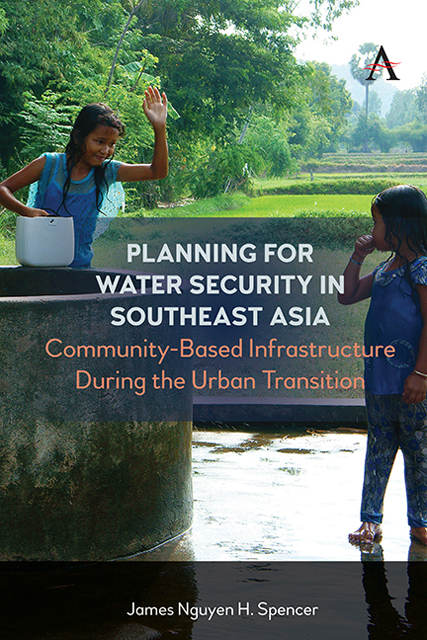 Planning for Water Security in Southeast Asia
Planning for Water Security in Southeast Asia Book contents
- Frontmatter
- Content
- Preface
- Introduction
- 1 Water and Human Security
- 2 Global Urbanization: The Confluence of Peri-Urbanization and Urban Transition
- 3 Community-Based Public Finance of Deep Well Water Systems in Peri-Urban Java
- 4 The Peri-Urbanization of Can Tho and the rise of Entrepreneurial Water Suppliers in the Mekong Delta
- 5 Ha Noi: Bulk Water Retailing in Peri-Urban Areas
- 6 Peri-Urbanization, Co-Production and Institutional Culture: The Case of the Phnom Penh Water Supply Authority
- 7 Beyond Resilience: Are we thinking about Entitlements, Participation and Governance in the Right Way?
- References
- Index
7 - Beyond Resilience: Are we thinking about Entitlements, Participation and Governance in the Right Way?
Published online by Cambridge University Press: 10 January 2023
- Frontmatter
- Content
- Preface
- Introduction
- 1 Water and Human Security
- 2 Global Urbanization: The Confluence of Peri-Urbanization and Urban Transition
- 3 Community-Based Public Finance of Deep Well Water Systems in Peri-Urban Java
- 4 The Peri-Urbanization of Can Tho and the rise of Entrepreneurial Water Suppliers in the Mekong Delta
- 5 Ha Noi: Bulk Water Retailing in Peri-Urban Areas
- 6 Peri-Urbanization, Co-Production and Institutional Culture: The Case of the Phnom Penh Water Supply Authority
- 7 Beyond Resilience: Are we thinking about Entitlements, Participation and Governance in the Right Way?
- References
- Index
Summary
In Chapter 1, I described a public and scholarly debate on the various ways in which urban water supplies are provided throughout the world. This description explicitly linked the evolution and development of these ways to the evolution of new forms of resilient local governance emerging in rapidly urbanizing settlements and places. Moreover, these forms of governance, offer a range of investments made by the public, private and civic sectors and shed light more universally on how participatory development processes evolve.
The findings from Gresik, Can Tho, Ha Noi and Phnom Penh provide substantive detail to the ways in which partnership and co-production clearly identify the coordinated commitments by households, communities and governments must make to increase access to clean water. The debate on public or private provision of water described earlier often masks these important regional differences and ad-hoc arrangements within countries. My description of these cases, I hope, has refocused the debate away from the public–private dichotomy, on to the more important issue of scale, both geographic and organizational. Private water providers can range from small water vendors to multinational corporations, while state providers can range from local water corporations to municipal and national corporations.
Thus, rather than looking to a Western-generated debate on public–private management systems, the empirical evidence from SEA suggests we should look elsewhere for institutional principles moving forward. Looking toward the near-term and mid-term future—the timeframes needed to manage the urban transition most effectively—institutions governing the urban transition cannot be divorced from their agrarian economies and histories.
The Agrarian Roots of Urban Informality: Peri-urbanization and the Provision of Urban Infrastructure
Scholars of urban water governance in the Global South have much to learn from agrarian social economies and political networks. After all, it is these networks, habits and practices that the newly urbanized agrarian residents bring with them to the peri-urban settlements described above. The starting point for understanding these kinds of networks is in the indigenous economies—here, roughly speaking the agrarian ones—that have now become part of the global economy. In densely settled societies like those of Viet Nam, Indonesia and Cambodia, the growth of cities might best be seen as a kind of “agrarian urbanization” that marks an initial moment of rapid change resulting from the rapid growth of the agricultural and resulting food processing industries.
- Type
- Chapter
- Information
- Planning for Water Security in Southeast AsiaCommunity-Based Infrastructure During the Urban Transition, pp. 181 - 196Publisher: Anthem PressPrint publication year: 2022
